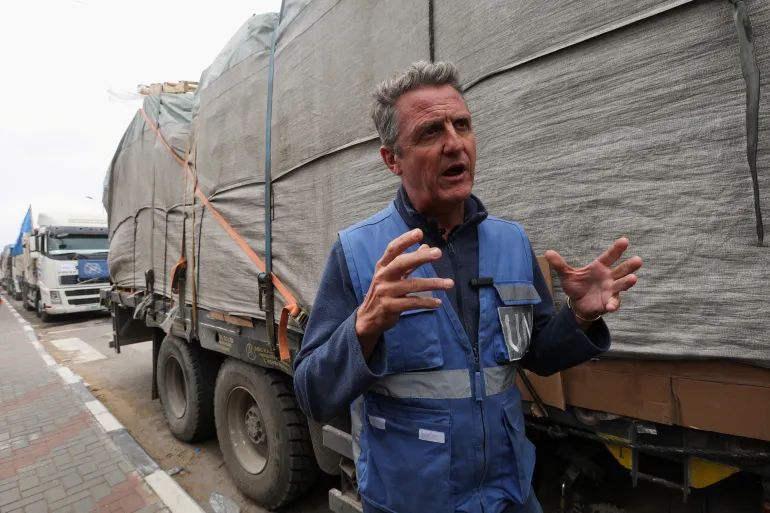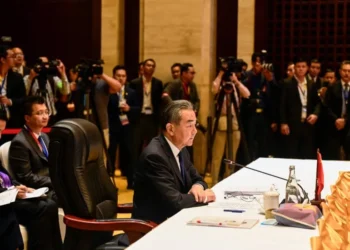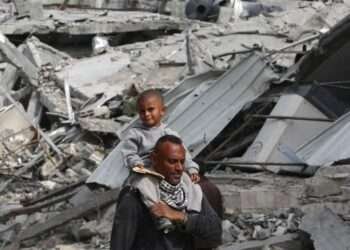According to Thomas White, Director of UNRWA affairs in Gaza, “nothing has changed” in the besieged enclave since the UN Security Council passed a resolution on Friday, December 22, 2023, evening to boost aid.
White told reporters that people continue to be pushed around Gaza into an increasingly smaller space.
“We have Rafah right now – a city that normally has 280,000 people – hosting a million people,” White said, adding that “aid trucks alone are not going to solve that problem.”
He reiterated the need for a ceasefire to end the suffering of civilians, hundreds of thousands of whom are living in the open, as “air strikes continue to hit all parts of Gaza.”
His comments came as Israel on Saturday, December 23, 2023, continued its deadly bombardment of Gaza, with the latest attacks reported in the Nuseirat refugee camp and Khan Younis.
White also said that the UN Security Council’s resolution “falls well short of what we need here in Gaza.”
“We need a ceasefire that will stop the killing of civilians and the destruction of civilian infrastructure in Gaza, but most importantly, to enable conditions on the ground here so we can effectively deliver aid to the people of Gaza.”
Thomas White
As there is no “safe and secure access for aid workers,” the organisation cannot deliver aid to much of the population, he said, adding that UNRWA aid workers are constantly at risk.
White joins the list of officials who criticised the UN resolution on Gaza aid as “insufficient.”
The resolution, passed after several days of delays, merely called for steps “to create the conditions for a sustainable cessation of hostilities” and demanded that all parties “facilitate and enable the immediate, safe and unhindered delivery of humanitarian assistance at scale” to Palestinian civilians.
Oxfam America’s Scott Paul emphasised that aid to Gaza “can’t work while the bombs are falling and destroying houses, factories, farms, mills, [and] bakeries.”
“There’s no point in bringing in flour if you can’t bake bread with it. So the focus is entirely wrong,” Paul said.
International medical charity, Doctors Without Borders (Medecins Sans Frontieres, or MSF) stated that the measure fell “painfully short” of what is needed to address the dire humanitarian crisis.
“This resolution has been watered down to the point that its impact on the lives of civilians in Gaza will be nearly meaningless,” MSF-USA Executive Director, Avril Benoit said in a statement.
He added, “Anyone with a conscience agrees that a massive scale-up of the humanitarian response in Gaza must take place without delay.”
UN Irrelevant In Resolving Israel-Hamas War
Tamer Qarmout, Assistant Professor in public policy at the Doha Institute for Graduate Studies, opined that the vote showed how the UN has become “irrelevant” to resolving the war.
“When the UN was formed after World War II, it was supposed to tackle, to prevent similar conflicts such as the one happening in Gaza,” he said.
“But it’s a political organisation that is controlled by powerful countries, especially those with veto power at the UN Security Council. So politics is there in every policy and little detail of the UN work.
“I don’t think this war can be resolved through UN channels … The UN is becoming irrelevant, marginalised, very politicised and its mandate is being questioned now.”
Tamer Qarmout
In addition, Ardi Imseis, Assistant Professor of international law at Queen’s University in Canada, said that the UNSC has yet again failed in its responsibility to safeguard international peace and security due to the actions of one member, the US, which is protecting its ally Israel.
He said that the two “find themselves out on a limb against the whole of the international community and all of it at the expense of the civilian population in the Gaza Strip – defenceless, starved, chased out of their homes, subject to a scorched earth tactic.”
READ ALSO: U.S To Sanction Foreign Banks That Support Russia Militarily





















